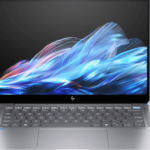
Hewlett-Packard (HP) has introduced the HP OmniBook Ultra, the first 14-inch x86-based notebook, which will be marketed as a “Copilot+” PC in the future. Thanks to a new AMD platform and its new NPU, AI performance is increasing significantly. However, Microsoft is still holding back the launch here too. HP
HP’s OmniBook Ultra would actually be a highlight, as it is one of the first 14-inch notebooks with a form factor designed for mobile use that meets the requirements for the new AI functions that make it a “Copilot+” PC. However, support for this is still lacking on the operating system side, as Microsoft only plans to provide a corresponding update later. As with the ARM-based Copilot+ PCs with Snapdragon CPUs, where HP is one of the first providers with the OmniBook X 14, Microsoft’s gigantic failure in terms of Windows Recall is preventing the original launch together with the new “killer feature”. However, the hurdles are even higher with the new x64-compatible systems, which have enormously increased AI performance thanks to an upgraded NPU.
HP is already offering at least some of the new AI features in the form of Windows Studio Effects and some other minor innovations on the ARM-based OmniBook sister model of the OmniBook Ultra, but it will probably take a while before the x64-based new PCs can offer the same features – even without Windows Recall.
According to HP, Microsoft will only distribute a corresponding update later in the year. This is particularly unfortunate because the hardware performance for the AI features with the new AMD Ryzen AI 300 CPUs is finally available on x86/x64 systems. With 55 TOPS, the NPU of the new APUs from AMD is even stronger than the AI processing unit of the Snapdragon PCs based on ARM.
Delivery of the HP OmniBook Ultra is scheduled to begin in August at a price of just under $1,450. Overall, the device offers a range of features that are certainly worth seeing, with the 14-inch display having a pleasantly high resolution of 2,240 x 1,400 pixels. In addition, there is a larger battery than in the ARM-based sister model with 68 watt hours, which means the device is also a bit thicker, wider and heavier. The port selection is similarly sparse, with two Type-C ports, a USB-A port and a 3.5 mm jack port. HP is also offering Thunderbolt 4 support for the first time in a consumer model with this device. So anyone looking for a “more compatible” AI PC will soon be able to use the OmniBook Ultra as an AMD-based alternative to the ARM-based models with Snapdragon chips.
The extent to which there are actually advantages in terms of runtime and performance in favor of the new ARM models will certainly become apparent in the coming weeks as part of initial tests. By then, Microsoft may have finished its update, which will then really turn the HP OmniBook Ultra and similar models from other manufacturers into “Copilot+” PCs. In addition to the OmniBook Ultra, HP has also introduced two first all-in-one desktops based on new Intel chips, which will probably also soon be updated to become “Copilot+” PCs.
Digital marketing enthusiast and industry professional in Digital technologies, Technology News, Mobile phones, software, gadgets with vast experience in the tech industry, I have a keen interest in technology, News breaking.
View Comments